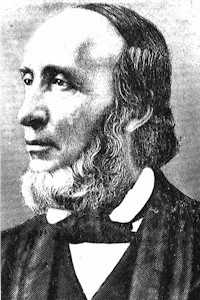Edmund Sears

Edmund Hamilton Sears (April 6, 1810 – January 14, 1876) was an American Unitarian parish minister and author who wrote a number of theological works influencing 19th century liberal Protestants. Sears is known today primarily as the man who penned the words to "It Came Upon the Midnight Clear" in 1849. It has been sung to two tunes, one by Richard Storrs Willis and another adapted by Arthur Sullivan from a traditional English air.
Sears originally wrote the song as a melancholy reflection on his times while a minister in Wayland, Massachusetts, USA. However, "It Came Upon the Midnight Clear" has since become a popular Christmas carol.
Biography
Born on April 6, 1810, the youngest of three sons of Joseph and Lucy (Smith) Sears, Edmund grew up on a farm within sight of the Berkshire Hills, in Sandisfield, Massachusetts. Sears attended Union College, in Schenectady, New York, where he was a member of the Delta Phi Fraternity. Following graduation from Union in 1834, Sears attended Harvard Divinity School, graduating in 1837 and began to preach as a missionary in Toledo, Ohio, remaining nearly a year. He served Greater Boston Unitarian congregations in Wayland, Lancaster, and Weston.
In addition to the above noted hymn, Sears authored the following publications: Regeneration, 1853; Athanasia; Calm on the Listening Ear of Night; Pictures of the Olden Time, 1857; The Fourth Gospel, the Heart of Christ, 1872; and Sermons and Songs of the Christian Life, 1875. With Rev R Ellis he edited "The Monthly Religious Magazine" for twelve years.
Basic biographical information on Sears may be found in History of the Church in Weston (1909), and Samuel A. Elliot, Heralds of a Liberal Faith, vol. 3 (1910). A more thorough account is Chandler Robins, "Memoir of Rev. Edmund Hamilton Sears," Proceedings of the Massachusetts Historical Society 18 (1891). See also Albert Christ-Janer et al., comps., American Hymns Old and New (2 vols., 1980); George W. Cooke, Unitarianism in America (1902); Conrad E. Wright, The Liberal Christians (1970); and Wright, American Unitarianism, 1805-1865 (1989). Obituaries and tributes are in the Unitarian Review (Feb. 1876); the Christian Register, 22 and 29 Jan. 1872; and the Boston Daily Advertiser, 18 Jan. 1876.
He died January 14, 1876, in Weston, Massachusetts.
Media
 |
It Came upon the Midnight Clear
Instrumental - Piano, Violin, and English Horn
|
| Problems playing this file? See media help. | |
External links
| Wikiquote has a collection of quotations related to: Edmund Sears |
| Wikisource has original works written by or about: |
|